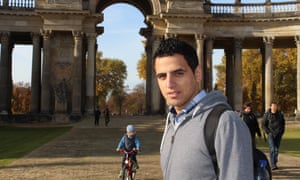
Kuhlod Al Ibrahim braved mortar bombs and snipers every day on her way to university. But she didn’t want to miss out on her literary and cultural studies lectures at Damascus University, even if it meant risking her life.
“My mum would beg me not to go,” she says. “But I would say, ‘mum, I need to go out. I need to continue my education’.”
After uni, she and her friends would meet in restaurants, because it wasn’t safe to be out in the open. When they were scared, they used humour to make light of the danger they faced – the punchline of a joke about a Syrian student who left home was that they actually made it back.
Today, Al Ibrahim, 24, drinks coffee in the bustling canteen of the Free University of Berlin, cheerful and chatty as she waits for her next lecture to begin.
She is studying for a master’s in English literature, after winning a competitive scholarship for Syrians and refugees provided by the German Academic Exchange Service (Daad). “Over here, my main worries are learning the language and deciding what Arab dishes to cook for my vegan German friend,” she says.
Young people such as Al Ibrahim, who have fled from war or persecution to study, are positive role models for other endangered youth, says Dr Dorothea Rüland, general secretary of Daad. “Students have a high social status. And these students make it clear that people really have a chance over here. This type of integration is very important for our society.”
There are currently no figures on the number of refugees studying at German universities, according to Thomas Böhm, at the body that represents universities, the German Rector’s Conference (HRK). However, Böhm adds, at recent campus events, hundreds have sought information about how to enrol. Daads predict that between 30,000 and 50,000 refugees will be eligible to study in Germany in 2016.
Laith Rastanawi, 25, a former refugee from Hama, west Syria, is studying for a master’s in mathematics at the Free University of Berlin after winning a Daad scholarship. He says studying in Germany is a dream come true, and has changed the direction of his life. He fled from Alleppo in Syria two years ago, having graduated with high marks from university there, and travelled to Turkey with his brothers.
“In Alleppo, there was no water or electricity, and bombing every day,” Rastanawi says. “I couldn’t stay.
“The journey to Turkey was difficult, we were afraid of being captured and taken to the Free Syrian Army, or of being bombed. When I first arrived I was optimistic, but then my dreams vanished. I had no money, even though I worked for 12 hours a day as a teacher and in a mobile phone shop. When I applied for bursaries I didn’t get them, and I was distraught.”
A year after his arrival in Turkey, a friend told him about the Daad programme and he applied. After a three-day party to celebrate his success, he made his way to Berlin.
Now, he says, he spends most of his time studying. “The academic work is a challenge and the bureaucratic German system is a shock. But this is a once in a lifetime chance and I want to use it in a good way.” Eventually, Rastanawi says, he wants to become a teacher in Syria.
It can be difficult for refugees to access higher education because of visa, language and funding issues. They can apply for government funding – getting up to €670 per month – though not until their asylum application has been accepted, which can take years.
“While they seek asylum they can do more or less nothing,” says Jens Kemper, coordinator of the refugee programme at the University of Bremen. “They have no access to the internet, and they can’t get to a quiet place because they are in overcrowded dormitories.”
Aamir*, 27, is currently waiting for his asylum application to be processed. In the meantime, he is sitting in on lectures at the University of Bremen for free. It’s a service the university is happy to provide, says Kemper. “By doing this, we give refugees something to do while they wait.”
Education has always been important to Aamir. His mother, who lives in Istanbul, placed a high value on it, despite having no formal qualifications herself. Aamir became an atheist while he was at university in Kabul studying English, but he felt unable to tell anyone. “I read religious philosophy and it made me question everything. But it was like living in a cage, because I couldn’t express myself openly,” he says.
In late 2014, Aamir’s diary was stolen, outing him as an atheist, and religious groups threatened his father at the mosque. He was scared that he and his family’s lives were in danger. Then, just weeks later, a young woman, Farkhunda, 27, was falsely accused of burning a copy of the Qu’ran close to Aamir’s home. She was thrown from a roof, run over by a car, beaten with sticks and stones, and set on fire in the streets by an angry mob. Aamir watched the news in horror and knew it wasn’t safe for him to stay in Kabul, so he travelled to Bremen in January.
He says attending university lectures while he awaits asylum has been a relief. He stays in the library until late at night, and that keeps his mind occupied. “It helps to be among students,” he says. “University is the one place where you’re not labelled.” When his asylum is granted, he wants to find work and eventually to study for a master’s in migration studies.
Language barriers can prevent refugees from getting information about free lectures. To help, Aamir goes into refugee camps as a volunteer and tells people about their options. “I don’t want anyone to stereotype us,” he says. “So I say to people, ‘you have to show them that you’re a normal human being. Get out there and learn – don’t let them label you’.”
Education for refugees is important, as it helps integration, says Rüland. “If we don’t manage to integrate people then we are in trouble. When people don’t feel at home, and they don’t see a chance over here, that is a problem. These students are positive examples.”
Universities want to support students who have fled from war, and many are offering funding, classes and extra help, as well as running buddy programmes to pair them up with with German students. However, they need political and financial support. “We have language and bridging courses. The challenge is to support these existing structures financially,” says Böhm.
For the students themselves, learning to navigate a new language, culture and education system is not easy. But Al Ibrahim, Rastanawi and Aamir are determined to make the most of the opportunities they have been given.
Al Ibrahim says facing danger in Syria has taught her how to cope when things get tough academically. “When the pressure’s on, I think to myself, I can do this, I’ve done it before.”
Her mother still worries about her, she says, but at least now the focus of her concern is whether her daughter is eating healthy meals.
When she’s not cooking or studying, Al Ibrahim likes to hang out with her friends in cafes. She’s grateful that these days she goes there to keep warm and to enjoy the food, rather than to hide from bombs.
*Name has been changed to protect the interviewee and his family.


